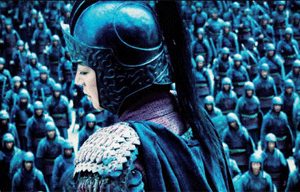Marriages need cash and love
Updated: 2011-10-18 08:33
By Jiang Xueqing (China Daily)
|
|||||||||
|
 |
|
A young couple say their oaths at a marriage registration office in Wuxi city, Jiangsu province. [Chang Lin / for China Daily] |
Only thing of value
The high pressure of city living forces people to become humble and practical in the real world, despite their noble pursuit of true love. In the eyes of ordinary people, owning a home is extremely important, said Jia Mingjun, founder and partner of the Shanghai Whole-Guard Law Firm.
"Our lawyers have been terribly busy answering phone calls since the Supreme Court announced the new interpretation of the Marriage Law," Jia said. He handled an average of 100 divorce cases a year from 2003 to 2006 and now deals only with cases concerning famous entrepreneurs and stars.
"Almost all divorce cases of ordinary people involve house properties. Unlike rich couples who care more about the partition of stocks, ordinary couples have nothing valuable to divide other than their houses."
 |
According to the Ministry of Civil Affairs, about 2.68 million couples divorced last year, and 668,000 of them went to court. During the past five years, the divorced population has increased by 7 percent on average every year.
'Very rational'
To avert possible legal disputes after marriage, a growing number of people have signed or prepared to sign prenuptial property agreements. Such contracts used to be considered a sign of distrust between a couple or lack of confidence in a marriage, and therefore were unacceptable to most Chinese.
Before marrying Wang Haoyu two years ago, Cui Yin bought a house in the Pudong New Area in Shanghai. The 90-square-meter house cost 1.43 million yuan, including an initial payment of 800,000 yuan.
At the time, the 35-year-old human resources director earned a salary 10 times greater than her fiance's. She could afford the initial payment on her own, and Wang contributed 200,000 yuan as part of the mortgage payment. The couple later wrote and signed an agreement acknowledging that the house belongs solely to Cui.
"My husband is very rational, so he had no objections to the agreement," said Cui, who now has a 1-year-old daughter. "I don't think it will do any harm to the love between us. Besides, the house was indeed earned by my hard work in the past."
During the past two years, the value of the home has grown from 16,000 yuan to 22,000 yuan a square meter. She said if they filed for divorce one day - although unlikely - she would keep the house and give part of its increased value to her husband, based on his contribution to mortgage repayment.
According to a 2008 Baihe survey of more than 2 million people in large and medium-sized cities, 44 percent have an open attitude toward prenuptial property agreements. Only 3 percent are unwilling to accept them.
Who's in charge?
As more women become financially independent, the way a couple spends money is also changing. When Hu Jingjing talked to her friends about family finance, she was surprised to hear that many couples spend their money separately rather than putting it together.
Fan Weimin, a 36-year-old corporate lawyer who lives in Beijing, and his wife, Zhou Nan, also a lawyer, have separate bank accounts. They pay for their own clothes and other everyday expenditures. When it comes to family expenses such as groceries, electricity and household appliances, either of them will pay, although the husband is more likely to.
Some of their friends have joint bank accounts to pay for common expenses of the family, but Fan believes that will only turn into an excuse for a quarrel.
"Who should be in charge of the joint bank account will become a problem," he said. "The wife certainly hopes that the account is in her hand so she will have a sense of security, but what if the husband also wants to take control of the money? Then they have to negotiate to reach an agreement."
He said that who is in charge of the money does not really matter, as long as both sides are honest about their incomes and disclose their banking information to each other.
Nowadays, more and more city couples have separate bank accounts and go Dutch in everyday expenses. Many of them still believe in love and consider mutual trust, tolerance and a sense of responsibility as key elements of a successful marriage.
"We've got to have faith in marriage, although conflicts between a couple are unavoidable," Fan said.
"Since we are tied with another person, we don't have to face the world alone, but have someone beside us to deal with it together. It's such a warm feeling."










